Email: [email protected]
The corrosion resistance of tinplate coil in chemical packaging is characterized by several key features that make it suitable for protecting contents from chemical reactions and environmental exposure:
Tinplate coil is steel sheet or coil that has been electrolytically coated with a thin layer of tin. This tin coating acts as a sacrificial barrier that protects the underlying steel from corrosion caused by exposure to chemicals and moisture.
Tin itself is chemically inert under many conditions, which means it does not react with a wide range of chemicals commonly stored or transported in the packaging. This inertness helps maintain the purity and stability of the contents.
Tinplate coil demonstrates good resistance to both acidic and alkaline environments. It can withstand exposure to acidic chemicals (e.g., acids used in industrial processes) and alkaline substances (e.g., cleaning agents) without significant corrosion.

The tin coating on tinplate coil provides an effective barrier against moisture and oxygen ingress, which can otherwise accelerate corrosion processes. This barrier helps to preserve the integrity and quality of the chemical contents over time.
Tinplate coil manufacturing processes ensure a uniform thickness of tin coating across the surface of the steel substrate. This uniformity enhances the overall corrosion resistance and ensures consistent protection throughout the packaging material.
Tinplate coil's tin coating also acts as a barrier against galvanic corrosion, which can occur when dissimilar metals come into contact in the presence of an electrolyte (such as moisture or chemicals). This property is particularly beneficial in mixed-material packaging.
Tinplate coil containers maintain their corrosion resistance and protective properties over extended periods of time, even under challenging storage and transport conditions typical in the chemical industry. This stability ensures reliable performance throughout the product lifecycle.
Depending on specific requirements, tinplate coil can be produced with different thicknesses of tin coating to enhance its resistance to specific chemicals or environmental conditions, offering tailored solutions for diverse chemical packaging needs.
These characteristics of tinplate coil's corrosion resistance make it a preferred material for chemical packaging applications where maintaining the purity, safety, and longevity of the contents is essential.
Related recommendations